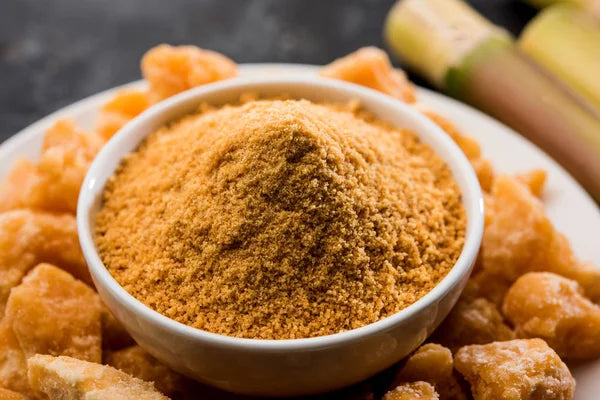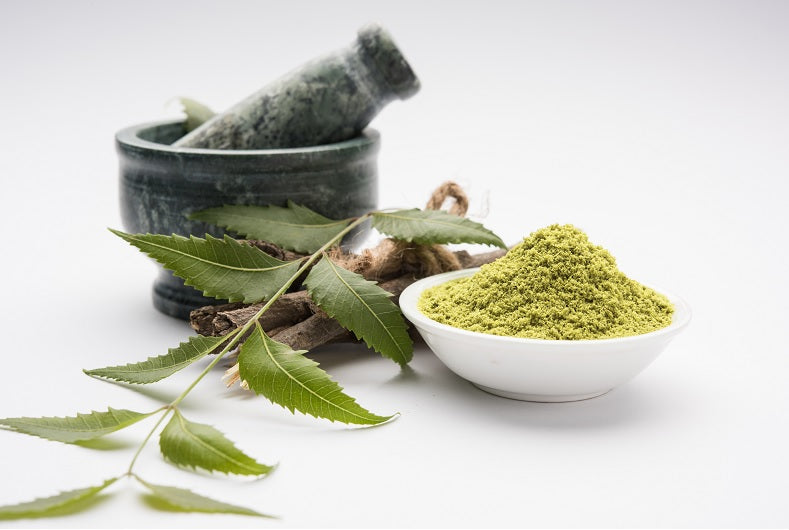
Organic Jaggery vs Sugar: The Healthier, Ayurvedic Alternative to Refined Sugar
15 Oct, 2025The Sweet Shift Toward Organic Wellness Modern diets are overloaded with refined sugar, an ingred...
Read more
Modern diets are overloaded with refined sugar, an ingredient that delivers instant pleasure but long-term health concerns like insulin resistance, inflammation, and fatigue. As awareness grows, many are seeking natural sweeteners that nourish rather than harm.
Enter organic jaggery, the wholesome, Ayurvedic answer to sugar cravings. Ayurveda views sweetness (madhura rasa) as essential for emotional balance, vitality, and nourishment, but when derived from natural, sattvic sources. Replacing refined sugar with organic jaggery offers the same sweetness with the bonus of minerals, antioxidants, and holistic wellness.
Organic jaggery is a traditional natural sweetener made from the juice of organically grown sugarcane or palm sap, processed without any chemicals, bleaching agents, or preservatives.
Unlike refined sugar, which undergoes multiple industrial treatments, organic jaggery is prepared by slowly boiling sugarcane juice in large iron pans until it solidifies into rich golden-brown blocks or granules.
This natural process retains iron, magnesium, calcium, potassium, and trace minerals while keeping its authentic earthy aroma and taste intact.
It’s free from sulphur, artificial clarifiers, and pesticides, making it the purest and safest sweetener for daily consumption.
While all three are sweeteners, their processing, purity, and health impact vary drastically:
|
Feature |
Refined Sugar |
Jaggery (Block) |
Organic Jaggery Powder |
|
Source |
Refined sugarcane |
Sugarcane juice/palm sap |
Organic sugarcane juice |
|
Processing |
Heavily refined, bleached |
Traditionally boiled, sometimes with lime or clarifiers |
Chemical-free, traditional boiling |
|
Color |
White / Crystalline |
Golden to dark brown |
Earthy golden brown |
|
Nutrients |
None (pure sucrose) |
Retains minerals |
Rich in minerals & antioxidants |
|
Health Impact |
Causes sugar spikes, no nutrition |
Balanced energy with nutrients |
Balanced energy and chemical-free |
|
Taste |
Neutral sweetness |
Deep caramel-like flavor |
Mild, natural sweetness |
In short, refined sugar provides only empty calories with no nutritional value, offering instant energy but long-term health drawbacks. Regular jaggery is a better choice, as it retains some natural minerals like iron and magnesium, though it may still contain impurities or chemical residues from conventional processing. In contrast, organic jaggery stands out as the purest, most wholesome option rich in essential minerals, free from chemicals, and aligned with Ayurvedic principles of sattva, supporting both physical nourishment and emotional balance.
Unlike refined sugar, organic jaggery retains iron, magnesium, calcium, and potassium essential for energy, blood formation, and bone health. Its natural antioxidants protect cells from oxidative stress, making it a far superior alternative to nutrient-depleted white sugar.
Ayurveda prescribes small amounts of jaggery after meals to activate Agni (digestive fire). It stimulates bile secretion, aids nutrient absorption, and gently cleanses the digestive tract, preventing constipation and sluggish metabolism.
Organic jaggery is a natural detoxifier. It helps flush toxins from the liver, purifies the blood, and improves hemoglobin levels. This cleansing property aligns with Ayurveda’s view of jaggery as a rakta-shodhak (blood purifier).
Jaggery releases glucose slowly, giving steady energy instead of sudden highs and crashes like refined sugar. This makes it ideal for those managing energy dips, fatigue, or mild blood sugar imbalances.
Rich in minerals and antioxidants, organic jaggery strengthens respiratory health and immunity, especially during the cold season. When combined with herbs like turmeric, tulsi, or ginger, it forms effective Ayurvedic remedies for coughs and colds.
Read Complete Guide to Organic Jaggery—>
According to Ayurveda, the madhura rasa (sweet taste) is essential for nourishment, satisfaction, and emotional stability. However, excess refined sweetness leads to Kapha imbalance, sluggishness, and dull digestion. Organic jaggery, being sattvic, offers balanced sweetness, calming the mind, strengthening tissues, and satisfying cravings without toxicity. When consumed mindfully, it prevents emotional eating and restores inner balance. Sweetness in moderation is medicine, not indulgence.
Organic jaggery isn’t just a healthier sweetener; it’s a step toward mindful, Ayurvedic living. Free from chemicals and rich in nutrients, it supports digestion, immunity, and emotional wellness while keeping energy levels steady.
Start by making small swaps, replace sugar in your tea, desserts, or detox drinks with organic jaggery, and feel the difference in vitality.
For personalized guidance on dosage and seasonal use, consult an Ayurvedic expert because true sweetness is the kind that heals.
Yes, organic jaggery is healthy. It’s rich in iron, magnesium, and antioxidants, supports digestion, boosts energy naturally, and is free from chemicals or additives found in refined sugar.
While organic jaggery is less processed and contains trace minerals, it still has a high glycemic index and can raise blood sugar levels quickly. In Ayurveda, jaggery is seen as Kapha-aggravating and linked to conditions like Prameha (diabetes).
Yes, small daily amounts (1–2 teaspoons) support digestion and provide minerals. Avoid excess intake to prevent weight gain or sugar fluctuations. Moderation is key to balance.
Both have different health benefits and work differently. In jaggery, the sugar content is heavier, warm and good for digestion, cleansing the body. But it may rapidly increase BP. Honey is lighter and warmer and helps to improve metabolism, when used in the raw form and in small quantity.
Yes, organic jaggery is safe and nourishing for all ages. It strengthens immunity, improves digestion, and provides gentle energy. Always ensure pure, chemical-free organic quality for best results.
Maharishi Ayurveda Jaggery Powder is the best choice, 100% organic, unrefined, and rich in natural minerals. It offers pure sweetness, supports digestion, and aligns with authentic Ayurvedic purity standards.
The Sweet Shift Toward Organic Wellness Modern diets are overloaded with refined sugar, an ingred...
Read moreWhat is Jaggery? (Gud) Jaggery, commonly known as Gur or Gud in Hindi, Bellam in Telugu, Vella...
Read more Guide to Immunity
Guide to Immunity
 Featured Articles
Featured Articles

Are you struggling with your oral health because of your eating habits? Are toothaches becoming your new normal because you have not been brushing well? Is eating ice cream a big NO, as you have brushed a little too much? A lot of you have been made to believe that your oral issues emanate from what you are doing wrong or not doing the right thing. What if we tell you that you have been approaching this all wrong and trying to solve the problems topically instead of addressing the root cause? Do you ever think about the real reason for these significant dental issues?
Ayurveda helps you focus on the fundamentals and identify the root cause. It is the science of treating the underlying imbalances and correcting the cause in a completely natural and effective way. Among its numerous health benefits, when it comes to oral health, Ayurvedic Toothpaste is a game-changer for preserving strong and healthy teeth. A natural and effective alternative to the chemical-laden equivalents and a beneficial synergy of herbs that help in holistic dental care. Surprising, right!? Well, read on to turn your surprise into a new belief!


नित्यमध्मान तां तांस्तु व्याधिभिश्च विवर्जितः।
रसैश्च दन्तमूलानां रूक्षैराचाम्य विक्रियाम्॥
Meaning: Regularly cleaning your mouth makes your teeth and gums healthy and prevents diseases.
The Charaka Samhita mentions the importance of oral care in overall health. This is more than just information from ancient scriptures; much research has validated the role of a healthy mouth in a healthy body. A 2022 study in Frontiers of Microbiology highlighted this critical link: an imbalance in the oral microbiome causes periodontal disease and promotes cardiovascular disease development.
Wondering how? Saliva is the first fluid that is secreted during digestion. It lubricates the tongue and oral cavity and ensures that the whole digestive tract stays lubricated, along with the chewed food passed down to the stomach. It carries all microbes into your gut and is the most crucial link between oral and overall health
Saliva also contains some antimicrobial proteins and enzymes that keep harmful microorganisms from growing while ensuring the good ones thrive. However, any saliva production or composition imbalance can affect the oral microbiota. This could be due to poor oral hygiene, an unhealthy diet, or systemic health issues.
This imbalance can have dire consequences for oral health, such as dental caries, gum issues, and infections. Moreover, balanced saliva helps lubricate and break down food for easy digestion and ensures that teeth get essential minerals to maintain and repair themselves.

Dantadhaawan is an ancient Ayurvedic oral hygiene practice that involves using herbal twigs, AKA ‘‘Datoon’’, to clean teeth and gums. Commonly used twigs include those from the neem, babool, and liquorice plants. These twigs have antimicrobial properties that help maintain oral hygiene.
According to the Shadrasa (six tastes) in Ayurveda, every herb has a Rasa (dominant taste) that determines its properties and actions.
An ideal toothpaste must contain Katu, Tikta, Kashaya, and Madhura Rasa, each of which positively impacts maintaining the health of our oral cavity.
Let’s uncover the properties of these essential Rasas to know more:
|
Rasa |
Action |
|
Katu (Pungent) |
It deeply cleanses the oral cavity |
|
Tikta (Bitter) |
Antibacterial & antiseptic action |
|
Kashaya (Astringent) |
Provides pain relief |
|
Madhura (Sweet) |
Strengthens the gums & teeth |
You see, an Ayurvedic toothpaste not only cleanses your teeth but also gives Bala (strength) through the properties of the natural Dravyas (herbs) used in it.

It may sound complex, but formulating toothpaste at home is as easy as making a face pack! All you need is 10 grams of dry leaves or powders of neem, mulethi, jamun, and amalaki. Grind or mix them, and your dry toothpaste powder is ready! During every brushing session (preferably morning and evening), mix it with your *Dosha-appropriate adjuvants. Vata *Dosha* can mix sesame oil, Pitta *Dosha* can mix ghee, and Kapha *Dosha* can mix honey/mustard oil, and your quick, healthy toothpaste is ready!
If you’re a busy bee, not interested in DIYs, or find it difficult to source these ingredients, don’t worry! We have Maharishi Ayurveda Ayurdent Toothpaste. It is your one-stop solution to all your oral problems. It’s a unique formulation that works on your saliva and is suitable for all body types, irrespective of the Doshic predominance.
It contains neem for cleansing, triphala for balancing, and meswak & ginger for stimulating saliva. Ayurdent promotes holistic oral health naturally and provides protection from major oral problems like cavities, plaque, bleeding gums, toothache, sensitivity, and bad breath. It contains the goodness of 20 Ayurvedic ingredients and is free from SLS and fluoride. Certified by COSMOS Natural, it stands out for its authenticity compared to other Ayurvedic and herbal toothpaste. This innovative, non-foaming formula is a must-try in the category.
 Recent Blogs
Recent Blogs


As per Ayurveda, no two individuals are alike. Maharishi Ayurveda offers personalised treatment for each individual at all touch-points. Consult our expert Vaidyas to get root cause-based personalised treatment from the comfort of your home
CONSULT VAIDYA
